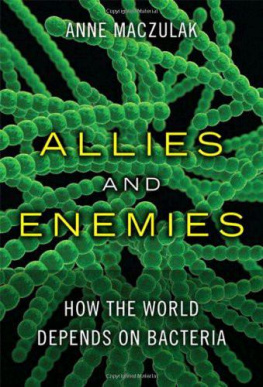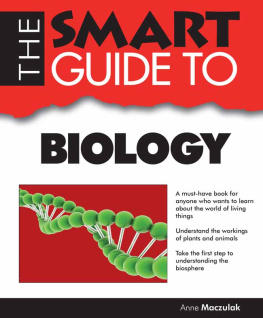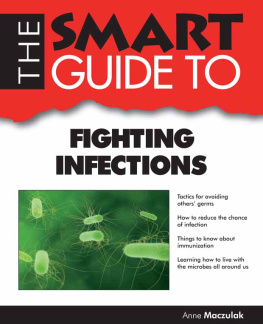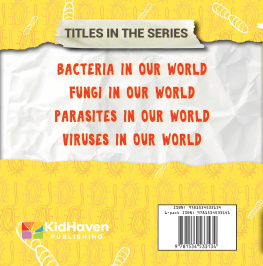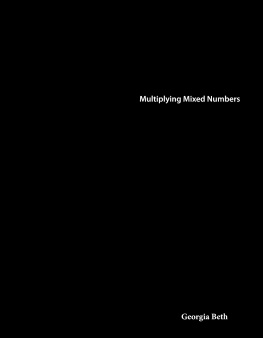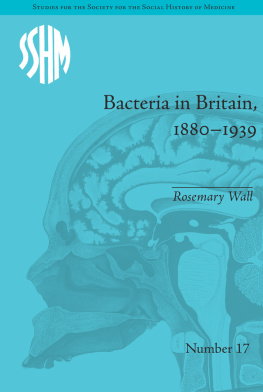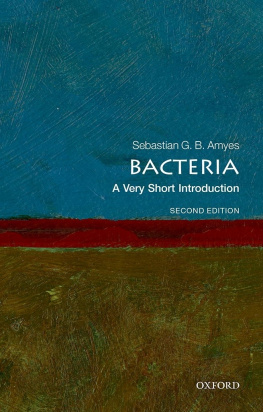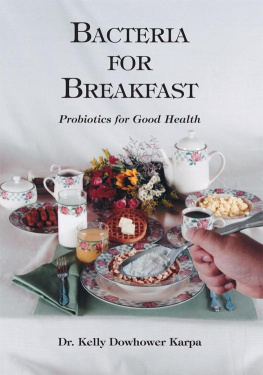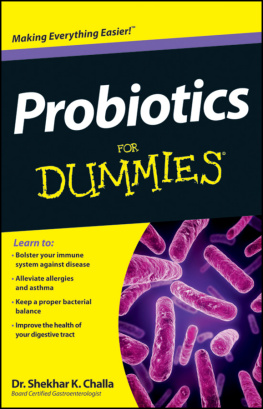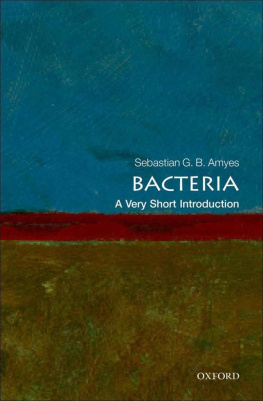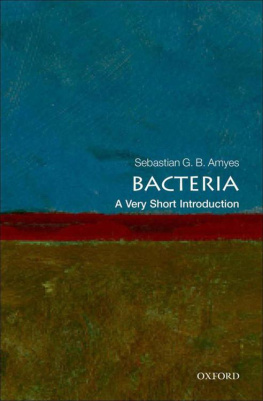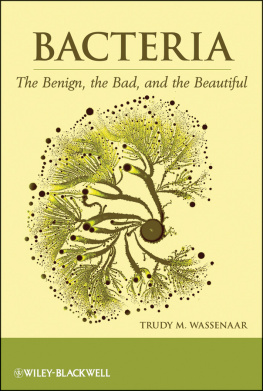Allies and Enemies
This page intentionally left blank
Allies and Enemies
How the World Depends on Bacteria
Anne Maczulak
Vice President, Publisher: Tim Moore
Associate Publisher and Director of Marketing: Amy Neidlinger
Acquisitions Editor: Kirk Jensen
Editorial Assistant: Pamela Boland
Operations Manager: Gina Kanouse
Senior Marketing Manager: Julie Phifer
Publicity Manager: Laura Czaja
Assistant Marketing Manager: Megan Colvin
Cover Designer: Alan Clements
Managing Editor: Kristy Hart
Senior Project Editor: Lori Lyons
Copy Editor: Geneil Breeze
Proofreader: Apostrophe Editing Services
Senior Indexer: Cheryl Lenser
Compositor: Nonie Ratcliff
Senior Manufacturing Buyer: Dan Uhrig
2011 by Pearson Education, Inc.
Publishing as FT Press
Upper Saddle River, New Jersey 07458
FT Press offers excellent discounts on this book when ordered in quantity for bulk purchases or special sales. For more information, please contact U.S. Corporate and Government Sales, 1-800-382-3419, corpsales@pearsontechgroup.com. For sales outside the U.S., please contact International Sales at international@pearson.com.
Company and product names mentioned herein are the trademarks or registered trademarks of their respective owners.
All rights reserved. No part of this book may be reproduced, in any form or by any means, without permission in writing from the publisher.
Printed in the United States of America
First Printing July 2010
ISBN-10: 0-13-701546-1
ISBN-13: 978-0-13-701546-7
Pearson Education LTD.
Pearson Education Australia PTY, Limited.
Pearson Education Singapore, Pte. Ltd.
Pearson Education North Asia, Ltd.
Pearson Education Canada, Ltd.
Pearson Educacin de Mexico, S.A. de C.V.
Pearson EducationJapan
Pearson Education Malaysia, Pte. Ltd.
Library of Congress Cataloging-in-Publication Data
Maczulak, Anne E. (Anne Elizabeth), 1954
Allies and enemies : how the world depends on bacteria / Anne E. Maczulak.
p. ; cm.
Includes bibliographical references and index.
ISBN-13: 978-0-13-701546-7 (hardback : alk. paper)
ISBN-10: 0-13-701546-1 (hardback : alk. paper) 1. BacteriaPopular works. 2. Microbial biotechnologyPopular works. 3. MicrobiologyPopular works. I. Title.
[DNLM: 1. Bacteria. 2. Bacterial Physiological Phenomena. 3. Bacteriologyhistory. QW
50 M177a 2010]
QR56.M26 2010
579.3dc22
2010006589
Contents
Acknowledgments..................... viii
About the Author....................... ix
Introduction........................... 1
Chapter 1
Why the world needs bacteria............ 7
Tricks in bacterial survival................... 9
Bacterial communities..................... 13
Under the microscope..................... 16
The size of life.......................... 20
The bacteria of the human body.............. 25
The origins of our bacteria.................. 29
One planet............................. 32
Chapter 2
Bacteria in history.................... 35
The ancients............................ 37
The legacy of bacterial pathogens............. 39
The plague............................. 42
Microbiologists save the day................ 46
Unheralded heroes of bacteriology............ 50
On the front............................ 58
Chapter 3
Humans defeat germs!(but not for long)... 63
What is an antibiotic?..................... 64
Inventing drugs is like making sausage......... 68
Mutant wars............................ 73
Bacteria share their DNA................... 77
The opportunists......................... 78
vi
allies and enemies
Chapter 4
Bacteria in popular culture.............. 83
Bacteria and art......................... 83
Bacteria in the performing arts............... 84
Friends and enemies...................... 89
Do bacteria devour art?.................... 91
Chapter 5
An entire industry from a single cell........ 99
E. coli................................ 103
The power of cloning..................... 106
A chain reaction........................ 109
Bacteria on the street.................... 112
Anthrax............................... 116
Why we will always need bacteria............ 117
Chapter 6
The invisible universe................. 121
Versatility begets diversity................. 124
Cyanobacteria.......................... 128
Bacterial protein factories................. 131
How to build an ecosystem................ 135
Feedback and ecosystem maintenance........ 138
Macrobiology.......................... 141
Chapter 7
Climate, bacteria, and a barrel of oil...... 145
The story of oil......................... 147
Bacteria power......................... 149
How is a cow like a cockroach?............. 150
Microscopic power plants.................. 154
The waste problem...................... 155
Bacteria on Mars........................ 160
Shaping the planet...................... 162
Epilogue
How microbiologists grow bacteria........ 165
Serial dilution.......................... 165
Counting bacteria....................... 167
Logarithms............................ 168
contents
vii
Anaerobic microbiology................... 169
Aseptic technique....................... 170
Appendix
Resources for learning more
about bacteria...................... 173
Internet resources on bacteria.............. 173
Book resources on bacteria................ 173
Classic reading on bacteria................ 174
Bacteria rule references................ 175
Index............................. 197
Acknowledgments
I became a microbiologist in Burk A. Dehoritys laboratory in 1978 studying anaerobes in cattle, sheep, and horses. From that point on I have met or worked with some of the most respected researchers in the fields of anaerobic, environmental, and water microbiology. Im sure they have forgotten more microbiology than I ever learned, but we collectively must admit that bacteria still hold a vast world of unknowns. I thank all of my professors of microbiology at the Ohio State University and the University of Kentucky.
For this book I owe thanks to Bonnie DeClark, Dana Johnson,
Priscilla Royal, Sheldon Siegel, Meg Stiefvater, and Janet Wallace for their advice on chapter content. Special gratitude is due Dennis Kunkel and Richard Danielson who always seem to offer encouragement when it is needed the most. Thanks are due to Amanda Moran and Kirk Jensen for their valuable guidance, and to Jodie Rhodes for tireless encouragement and support.
About the Author
Anne Maczulak grew up in Watchung, New Jersey, with a plan to become either a writer or a biologist. She completed undergraduate and
masters studies in animal nutrition at The Ohio State University, her doctorate nutrition and microbiology from the University of Kentucky, and conducted postdoctoral studies at the New York State Department of Health. She also holds an MBA from Golden Gate University in San Francisco.
Anne began her training as a microbiologist studying the bacteria and protozoa of human and animal digestive tracts. She is one of a relatively small group of microbiologists who were trained in the Hungate method of culturing anaerobic microbes, meaning microbes that cannot live if exposed to oxygen. In industry, Anne worked in microbiology laboratories at Fortune 500 companies, developing anti-dandruff shampoos, deodorants, water purifiers, drain openers, septic tank cleaners, and disinfectantsall products that relate to the world of microbes. She conducted research in the University of California-San Franciscos dermatology group, testing wound-healing medications, antimicrobial soaps, and foot fungus treatments.

